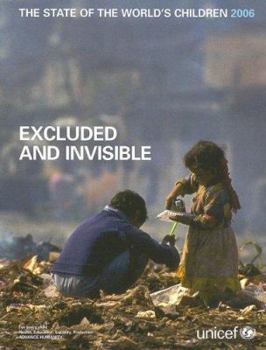The State of the World's Children: Excluded and Invisible
The 2006 edition of UNICEF's annual report focuses on the millions of children who are most in need of access to essential education, health and protection services, but who are also the hardest to reach and often overlooked by current development programmes. These include children living in the poorest countries and most deprived communities within countries, children who face discrimination on the basis of gender, ethnicity or disability, children caught up in armed conflicts or affected by HIV/AIDS, children who lack a formal identity and who suffer from abuse and exploitation. The report examines the factors which result in their exclusion from current child development programmes and services, and highlights the policy options and actions required to address these challenges, in order to ensure all children benefit from the progress being made to achieve the Millennium Development Goals. Topics discussed include: income disparities and child survival, the marginalisation of Roma communities and their children, disability issues, children and HIV/AIDS, children living on the streets, early marriages, child labour, child protection and child rights.
Format:Paperback
Language:English
ISBN:9280639161
ISBN13:9789280639162
Release Date:December 2005
Publisher:U N I C E F (United Nations Children's Fund)
Length:143 Pages
Weight:1.11 lbs.
Dimensions:0.3" x 8.4" x 10.8"
Customer Reviews
1 rating
Another vitally important survey from Unicef
Published by Thriftbooks.com User , 18 years ago
The United Nations Children's Fund, UNICEF, has a fine record of honestly surveying the appalling impact that our present economic system has on the health and welfare of children across the world. For example, their recent report, Child poverty in perspective: An overview of child well-being in rich countries (Innocenti Report Card 7, UNICEF Innocenti Research Centre, Florence, 2007) found that Britain and the USA are the worst places to grow up while northern European countries are the most child-friendly. American and British youngsters have a more troublesome childhood than their European counterparts. They are poorer, get on worse with their parents and take more risks. In comparison with children living in the other countries studied, those growing up in the USA and Britain have the lowest quality of life. The report compared the level of children's well-being in 21 economically advanced countries. Despite being among the richest, Britain and the USA occupied the last two places in the list, with the Netherlands, Sweden and Denmark taking the top three slots. The findings suggest that national wealth does not correspond directly to quality of childhood: the Czech Republic, for example, outranked richer countries like the USA, Japan or Germany. The level of children's well-being was assessed through measuring six factors: material well-being; health and safety; education; peer and family relations; behaviours and risks; and self-perceived subjective well-being. Although northern European countries like the Netherlands did well on the overall score, "all countries have weaknesses that need to be addressed," said David Bull, director of UNICEF UK, "No country features in the top third of the rankings for all six dimensions." There are, however, clear losers. "The United Kingdom and the United States find themselves in the bottom third of the rankings for five of the six dimensions reviewed," UNICEF said in its summary. Britain got the lowest overall score and ranked worst in family and peer relationships - measured by single-parent rates and the frequency of family meals - and behaviours and risks.





